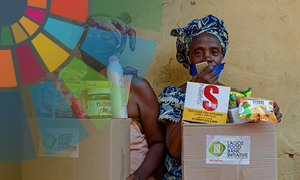As much as one third of all food produced is lost or wasted. Rather than reaching the estimated up to 811 million people who face hunger around the world, that food is thrown away and decomposes, contributing 8%-10% of global greenhouse gas emissions. Loss and waste occur across food supply chains: On farms, because of surplus or imperfect products, and downstream due to inadequate storage infrastructure and consumer confusion or inefficient behavior.
There is another important—if less obvious—culprit: Policies and laws that prevent safe, nutritious surplus food from being redistributed to those in need and away from landfills.
These barriers take various forms. Producers may have liability concerns about donating surplus food because of potential safety and health issues. Tax policies can make such donations more expensive than simply throwing food away. Consumers can be confused about whether date labels reflect food safety or simply ideal freshness. While more robust and efficient supply chains have improved food access for millions, differing national laws regarding food donations complicate and sometimes thwart efforts to recover and redistribute food. This lack of legal clarity across countries hinders progress globally on food loss and waste reduction and hunger relief.
A joint research study by the Harvard Law School Food Law and Policy Clinic and The Global FoodBanking Network analyzes and compares such laws across more than a dozen countries. Its findings demonstrate that laws and policies can be crafted with the end goal of increasing food donations and food access while decreasing food waste, and thus support countries—and critical partners including food banks, food recovery organizations, and businesses—on the path toward sustainable food systems.
Successful food donation policies in practice
The liability issue is one example. In 2018, to address donor concerns over potential legal exposure, Argentina expanded its Food Donation Law to provide the necessary liability protections. Between 2019 and 2020, food donations to Red Bancos de Alimentos Argentina, the country’s food bank network, rose 119%, aided in part by the Food Donation Law revision and other policy changes—providing food banks with a crucial resource to meet increased demand due to the COVID-19 pandemic.
Another example is date labeling policies whose “sell by,” “expires on,” or “best by” terminology can confuse food donors, food recovery organizations, and individuals. In the United Kingdom, standardized food labels distinguish between dates used for safety and dates used for quality. To further address this issue, U.K. government agencies partnered with organizations including WRAP to further clarify food safety and date labeling requirements in the context of sale and donation. These campaigns have helped reduce U.K. food waste by 1.6 million tons per year since 2007.
Transportation and storage costs are often cited as reasons manufacturers, retailers, and restaurants don’t donate food. In Colombia, a national income tax incentive rewards individual and corporate taxpayers who donate safe surplus food to food banks or registered nonprofit organizations, offsetting costs and making donation a more affordable option. The presence of strong laws and policies have helped the Network of Colombian Food Banks (Asociación de Bancos de Alimentos de Colombia, or ABACO) recover and distribute an estimated 25,089 tons of food to more than 650,000 people throughout the country.
In each of these cases, the adopted policies allowed for better use of excess food, strengthened the food system through efficient, socially responsible allocation of surpluses, and prevented more food from ending up in landfills. In short, policies like these are a win-win for people and the planet.
Looking ahead
Of course, the problem of food loss and waste is multifaceted and such policy changes are only part of the solution. Across the food supply chain—from production to transportation and storage to distribution—there is significant room for additional support, improved infrastructure and practices, and capacity building.
But as global policymakers gather to present food systems game-changing solutions at the United Nations Food Systems Pre-Summit in the coming months, they have an important opportunity.
Now is the moment for government leaders to consider how national policy environments enable or hinder progress toward zero hunger and responsible consumption, and a critical item on the agenda must be food donation legislation that advances food security and reduces food waste. We have a blueprint that draws on the success of countries around the globe, highlighting the very best policies and practices. Let’s use it to build a sustainable food system.
Emily Broad Leib is Clinical Professor at Harvard Law School and Director of the Law School’s Food Law & Policy Clinic; Doug O’Brien is Vice President, Programs, The Global FoodBanking Network.







